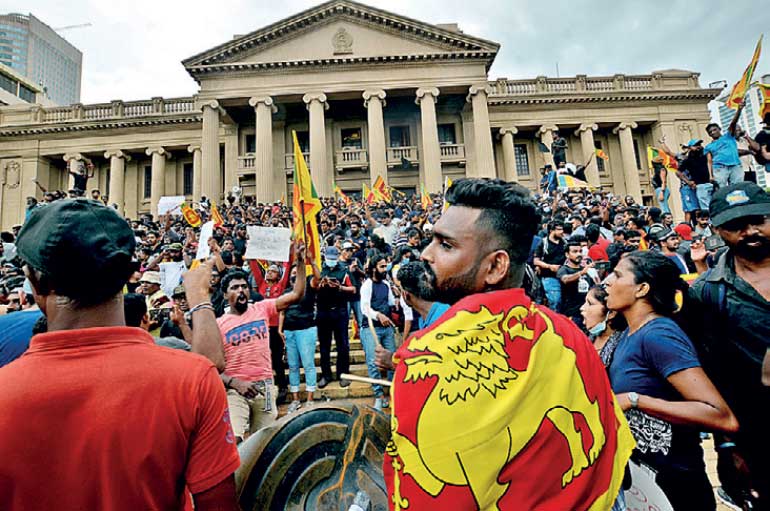Monday Feb 16, 2026
Monday Feb 16, 2026
Tuesday, 12 July 2022 00:45 - - {{hitsCtrl.values.hits}}

The real struggle has not finished yet, it has only begun
– Pic by Shehan Gunasekara
History has proved again and again that when unarmed people come out to the streets and maidans in tens and hundreds of thousands, guns and cannons of the police and soldiers would fall silent. There is nothing to beat the power of people. Aragalaya has succeeded in awakening the conscience of Sri Lankans at last. Congratulations to those youngsters for creating a mini-human tsunami to chase out the President.
The momentum of protest, which actually started with that spontaneous march from Pottuvil to Polikandy on 3 February 2021 by Tamils and Muslims culminated, after a short interval, at Galle Face Green with the Aragalaya, headed by an enlightened generation of Sinhalese youth, in April 2022. For more than three months these youngsters kept their vigil and cool, sacrificed their comforts, remained resolutely apolitical and won the admiration of a variety of well-wishers, both at home and abroad. Sadly, that coolness was shattered by setting fire to the private residence of Prime Minster Ranil Wickremesinghe and vandalising President’s palace. Such rowdiness should be stopped at once to protect the sanctity of the Aragalaya mission and its ultimate goal of systemic change. The real struggle has not finished yet, it has only begun.
Aragalaya is at the cusp of achieving one of its primary objectives of sending Gotabaya home and ending with him an authoritarian and corrupt regime. There is no question that those who were responsible for bankrupting the nation should be brought to books. They should not be allowed to hide anywhere in the world until they clear their names. But apart from that, the real focus of the Aragalaya mission should be to bring about systemic change, which goes far beyond changing personalities and government.
It is a mission dedicated to put in place a new socio-political and economic order, which constitutionally combines democracy with rule of law and an economy that guarantees minimum level of subsistence to all with rewards for the enterprising and productive. The constitution should be people-oriented with proper checks and balances to prevent it being hijacked by the numerically strong and economically powerful. Until that is achieved Aragalaya should continue with its mission and maintain the pressure for change.
This generation is quite capable of realising its mission, because it is qualitatively different from its predecessors – an observation some would find uncomfortable to accept. To start with, this generation of youth is more knowledgeable about happenings in the world in which it lives. It constantly in touch with its counterparts, shares their feelings and aspirations, and is deeply committed to the cause of freedom, justice and rights. These men and women are not simply romantically attached to these causes, but are prepared to struggle to achieve them.
They realise that the present world order is corrupt, unjust and discriminatory, and issues that are dominating world attention such as global warming, gender inequality, famines and starvation, poverty and squalor, social discrimination and so on are direct outcomes of an unjust world order or system, which needs serious restructuring. They therefore demand systemic change. Sri Lankan aragalaya is the local chapter of this worldwide phenomenon. With cautious optimism one could assert that it is from this community of youngsters, perhaps in alliance with a couple of existing progressive groups, that a new Lee Kwan Yew would emerge to take this country from a failed state towards somewhere closer to another Singapore.
In the meantime, an interim government with a small cabinet of technocratic ministers should be sworn in and that government should continue negotiating with IMF and other aid agencies for temporary relief to ease the dollar crisis. A renewed effort should be made with friendly nations, and particularly with the Arab world, to tackle shortages in food, fuel and medicine. Above all, the country’s production base, which once brought in respectable amounts of foreign exchange but systematically destroyed over decades by politically designed economic policies, which ended up not in exporting products but the producers themselves, requires radical reparation.
A permanent solution to the economic crisis has to come from the production base. There is no alternative for a balance of payment surplus if the nation wants to recover from its catastrophe. This is where the systemic change becomes an absolute necessity. Until then people have to endure more suffering. The interim government should quickly set a timeframe for general election, because no government should continue without a mandate from people. The danger is that an election may bring back the paragons of the defunct system to betray the expectations of the new generation, in which case Aragalaya has to continue into the future.
(The writer is attached to Murdoch Business School, Murdoch University,
Western Australia.)